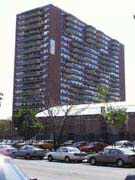They didn’t have far to walk.
Two dozen residents trekked across the street Wednesday from their Metropolis Towers homes on Marin Blvd. into City Hall to tell their tales about a set of buildings with a history more convoluted than a Thomas Pynchon book.
Four and a half hours later, the council punted, and no one knows what will happen next.
The saga of the 770-unit co-op buildings in the desolate high-rise stretch between City Hall and Exchange Place raises an old bugaboo for the city: rent control. Tampering with the long-sacrosanct institution has the potential to leave lawmakers vulnerable, and the case could have implications for other housing in the city.
At the heart of the matter is the fate of 65 tenants who will face high rent increases if the city passes an ordinance amending rent control. On the other side is an individual who has assumed debt on a chronically-unpaid mortgage and taken a “share” of 340 abandoned apartments. He says he needs to get the higher rents so that he can make adequate repairs to the dilapidated buildings. If only it were that simple.
The story
In December of 1999, George Filopoulos, president of Metrovest Equities, Astoria, Queens, assumed a portion of the $25 million mortgage on the buildings from the federal department of Housing and Urban Development, which had taken over the two buildings and was ready to foreclose.
The former administrator of the city’s Rent Leveling Board gave Filopoulos the option of going ahead with a one-time rent increase. So Filopoulos sent letters to tenants informing them of the potential increase, and long time dwellers were alarmed to see that their rents might jump by as much as 150 percent. Many got eviction notices. Many sued.
Hudson County Superior Court Judge Jose Fuentes determined in May that the leveling board administrator’s actions were improper, and said the city’s rent control ordinance kept the building effectively under rent control.
“This is a fairly unique situation,” said Greg Diebold of Hudson County Legal Services, who represents three of the tenants. “In 20 years, this is the first time I’ve seen this particular situation.”
So Metrovest sought to make a specific change to the city’s rent control law, which sets limits on rent increases.
Under proposed changes, buildings that had not been specifically covered under the city’s rent control law (like co-op buildings or buildings whose rents were set by HUD and are coming off HUD control) would be allowed to have a one-time rent increase and then come under the city’s rent control laws. Twenty-seven buildings in the city may be affected by the change, like Summit Plaza, Arlington Arms, and Unico Towers. But the senior-only Hamilton Park complex, said Corporation Counsel Sean Connelly, would still qualify for a senior citizen exemption, even if it fell from HUD control. On Wednesday, the administration proposed inserting language that would have essentially allowed for co-ops and condos coming out of bankruptcy to allow the one-time increase. That proposal was not adopted.
Currently, the rent increases allowed under rent control are limited to the Consumer Price Index, a figure the Bureau of Labor publishes periodically. The most recent increase was around two percent.
The rent control laws apply to buildings with four or more units. Part of the rent control revision will include language putting co-op “shareholders” with more than four units under rent control, too.
Co-ops are different
A co-op building is a strange bird in New Jersey.
It’s best to think of a co-op as a stock, in which individuals buy into a share of the property. In a sense, everyone is a part-owner of the property, and each “shareholder” pays a certain amount each month in maintenance fees. These fees go towards paying taxes, upkeep, and mortgage on the building, among other things.
The problem for Filopoulos was that some individuals in the 340 units he took over had abandoned their units or leased the spaces out and collected the money from tenants but never paid their fees for the mortgage. As a result, the building slipped into horrible disrepair. Windows popped out of frames, elevators broke, and HUD started foreclosure procedures, which could have meant the eviction of the tenants from the buildings.
But can all the tenants foot the bill for these problems?
One case
Take the case of Andrew Olenhaus, 56, who has been living in the complex since 1974. Right now, he pays $408, but his rent under the new plan would soar to $950. To boot, his parking has gone from $35 to $150. The out-of-work forklift operator currently lives off the pension from an early retirement plan from his former employer, and would be hard-pressed to pay nearly $1,000 in rent.
“I live off the homeless,” he said. “I pay them $4, and they bring me food.”
Filopoulos said he wants to deal with cases like Olenhaus’s on an individual basis, but at the same time, he wants to settle the larger legal case. He suggested that while these tenants would not pay as much as originally proposed, they would pay some sort of increase.
In addition, those tenants who are 62 or older would be eligible for special consideration as well, even though they are not provided protective status under the law.
Yet Filopoulos notes that the location of Metropolis Towers is prime. In the heart of Downtown, across from the Grove St. PATH station, where rents for one bedrooms go for around $1,200, he doesn’t think his raises are unreasonable.
After hearing testimony from residents during Wednesday night’s meeting, the council moved to table the ordinance for future consideration. Council members Bill Gaughan, Melissa Holloway, Fernando Colon and Tom DeGise voted against tabling the ordinance.
“I don’t think this belongs with us,” said Councilman-at-Large L. Harvey Smith on Monday. “This belongs with the Rent Leveling Board.”
